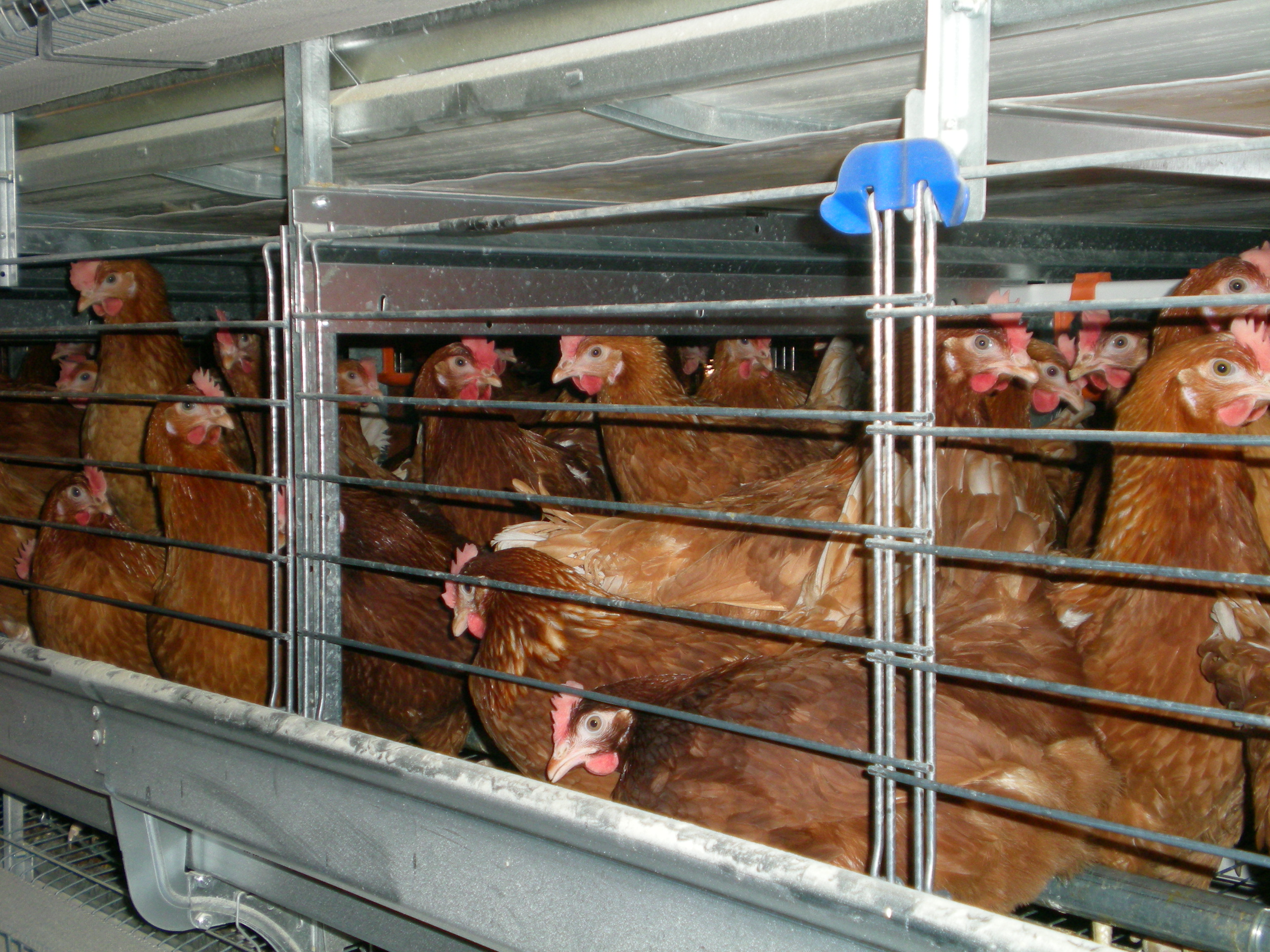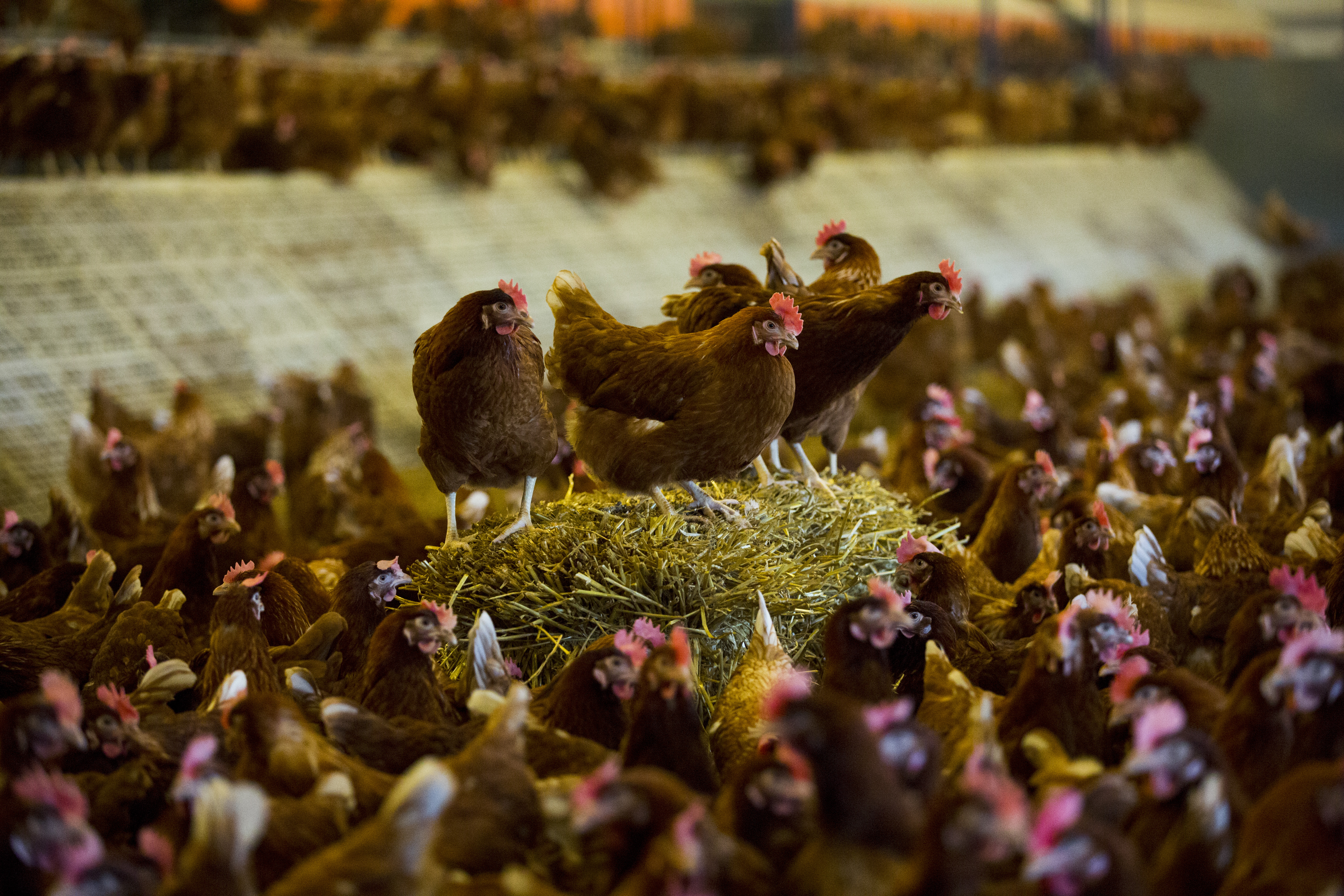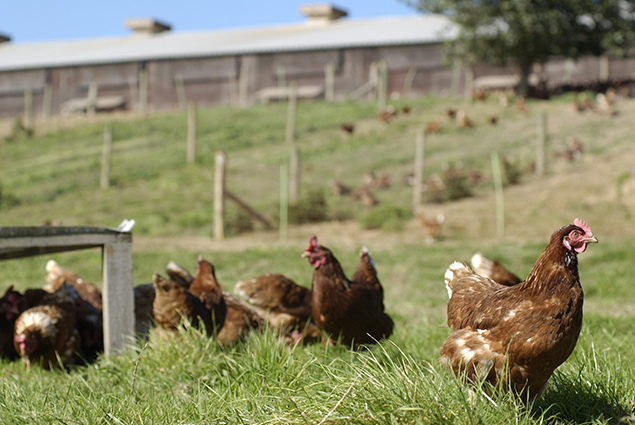What Is A Battery Hen?
Battery hens are egg-laying hens that are kept in battery cages. In these traditional battery cages, one hen was kept in one cage and these cages were kept together, often in long rows.
The term battery simply means an arrangement of rows and columns of identical cages connected together in a unit. When we refer to battery cages this is what we mean. There are battery cages and there are enriched or colony battery cages.

It may surprise you to know that about forty per cent of egg-laying hens in the UK are still kept in cages for the majority of their lives. This is something we are very concerned about. On RSPCA Assured farms, hens can never be kept in cages and must always be looked after according to the RSPCA’s strict higher welfare standards.
Are Battery Hens Illegal?
In 2012, the use of conventional battery cages was banned in Europe. The old battery cages were replaced by a new type of battery cage called a colony or enriched cage. While these are an improvement, unfortunately, the difference is negligible. Hens kept in battery cages had a useable living space per hen equal to a piece of A4 paper, and the space they now have is only equal to an A4 piece of paper plus a postcard per hen.
These new cages must also provide the birds with enrichment facilities such as low-level perches, nest boxes and scratch mats.
Why Are Battery Cages Bad?
Cages, whether we are talking about traditional cages or the new enriched cages, limit the hens’ ability to move around. They restrict the hens' ability to perform natural behaviours and can cause the birds to suffer high levels of stress and frustration. Like all animals, hens need to be active and perform their natural behaviours like walking, nesting, perching, stretching their wings, dustbathing (this is very important), scratching the ground, and foraging.
Why Do Battery Hens Have No Feathers?
Being in a cage with restricted ability to perform natural behaviours, the hens can become stressed and frustrated, this can lead to abnormal behaviours where the birds will pull out each other's feathers and can be the major cause of bald patches.
When they are kept in cages, the hens have to put their heads through the bars to feed, this can sometimes cause de-feathering on their necks and heads where the bars rub.
What Happens to Battery Hens When They Stop Laying?
Whether in cages or free-range, hens' egg production begins to decline at about 72 weeks old. When this happens they are sent to slaughter.
No hens on RSPCA Assured farms are ever kept in cages and when they do reach retirement age, unlike with some other schemes, they must be transported and slaughtered, according to RSPCA standards.
Does the UK Still Have Battery Hens?
Approximately 35.5% (Defra, 2021) of the eggs we consume in the UK come from hens kept in still kept in cages. While they are no longer kept in the conventional battery cages which were banned in Europe in 2012, the new ‘colony’ or ‘enriched’ cages only provide slightly more space and still severely limit the birds' natural behaviours.
Why Were Battery Cages Introduced?
In terms of welfare, battery cages are never good. The system of keeping egg-laying hens in small cramped cages began in the 1930s. Sloping floors and a conveyor belt allowed for more efficient collection and keeping the hens on wire mesh meant it was easier to remove the manure.
What Breed of Hens Are Battery Hens?
The most common and well-known breeds used in many of the UK laying systems are Lohmann, Bovan, Hyline, ISA Brown, Novagen, Dekalb, and H&N.
How Much Space Do Battery Hens Get?
Modern colony cages typically house between 80 and 100 hens, so while the cages are quite large, allowing the hens to move around, their actual living space is still very small.

Do Rescue Battery Hens Lay Eggs?
Yes, they do. While the rate at which rescue hens lay eggs is slower, they do continue to lay and if kept in the right environment, rescue hens can live a long egg-laying life.
Do the RSPCA’s Standards Really Make a Difference to Laying Hens?
Yes, the RSPCA standards are based on a combination of scientific research, veterinary advice and practical farming experience and aim to provide animals with a good life. The standards cover key welfare issues and give birds more opportunities to express natural behaviours, compared to the minimum welfare standards set out in the Welfare of Farmed Animals Regulations. Find out more about RSPCA Assured hen welfare standards.
How Often Do Battery Hens Lay Eggs?
Eggs nowadays come from commercial breeds of hen which have been specifically bred to lay eggs. Depending on the breed, living conditions and age, most hens kept in enriched cages and those on free-range farms can lay any number between three or four up to even seven eggs a week.
Are Battery Chickens Banned in the UK?
Sadly not. In the UK, about 35% of chickens that lay eggs are still kept in cages. Chickens bred for their eggs are called laying hens. Chickens bred for meat, are referred to as chickens or broilers and in the UK, they are never kept in cages.
Are Cage-Free Chickens Really Cage-Free?
On RSPCA Assured farms, hens can never be kept in cages. Birds can only be kept free-range, organic or in large barns where they are free to roam around and able to perform natural behaviours like nesting, perching and dust bathing.
The RSPCA’s standards insist on enrichment and perches. By providing properly designed raised perches in the right positions in the hen house, the birds’ welfare is significantly improved.
Are Free-Range Eggs Better Than Barn Eggs?
It isn’t simply a case of outdoors being better and indoors being bad. Indoor environments for both barn and free-range hens can provide all of the opportunities required to perform natural behaviours such as perches and pecking objects.
That’s why we aim to improve the welfare of all farm animals, whether they are kept indoors or outdoors. The RSPCA’s standards cover all systems of production including indoor, free-range and organic (but never cages) and all stages of an animal’s life from hatching to slaughter.
How Are RSPCA Assured Free-Range Eggs Different from Non-RSPCA Assured Labelled Free-Range Eggs?
RSPCA Assured free-range hens are given more environmental enrichment both inside and outside. Shade and shelter, including trees and bushes which protect birds from bad weather and predators, are also a requirement. This helps the birds to feel safer and range more freely, exploring the space around them.
RSPCA Assured hens must also have access to raised perches. Giving hens the chance to perch allows them to express their natural behaviour and helps improve their leg strength. Find out more about the benefits of perches to hens’ health.
Are Birds on Organic Farms Allowed to be Beak-Trimmed?
No, organic standards do not permit beak trimming.
What Can People Do to Help Improve Laying Hen Welfare?
Choose non-caged eggs such as RSPCA Assured, free-range, organic and barn.
And don’t forget that eggs are also used as ingredients in food including pies, quiches and sandwiches.
Are Hens Still Kept in Battery Cages?
Whilst the conventional battery cage was banned in 2012, hens in the UK now are kept in one of the following systems.
Colony or Enriched Battery Cages
On average a ‘colony’ cage holds 80 hens and has a screened-off area for laying, a scratch mat and low perches. Once placed in a cage, the hens won’t leave the cage until they go to slaughter.

Barn
Hens live in large flocks within a barn environment, these hens do not have outdoor access. The hens have a solid floor (covered in a litter substrate such as wood shavings) and access to nest boxes.

Free-Range or Organic
Birds have access to the outside world, where they can experience a more varied natural environment. Whether the system is free-range, organic free-range or multi-tier free-range, the hens can exhibit their natural behaviours.

